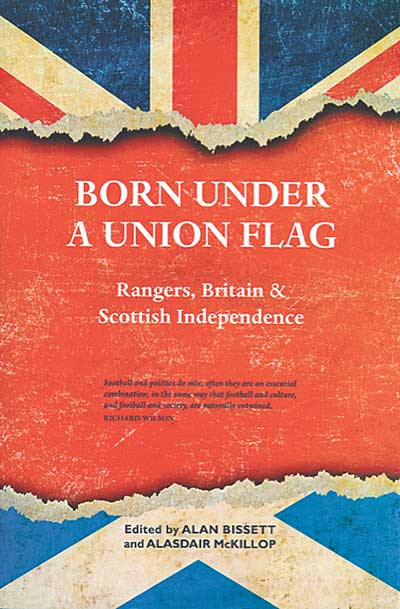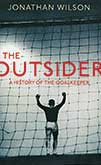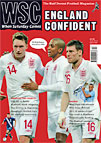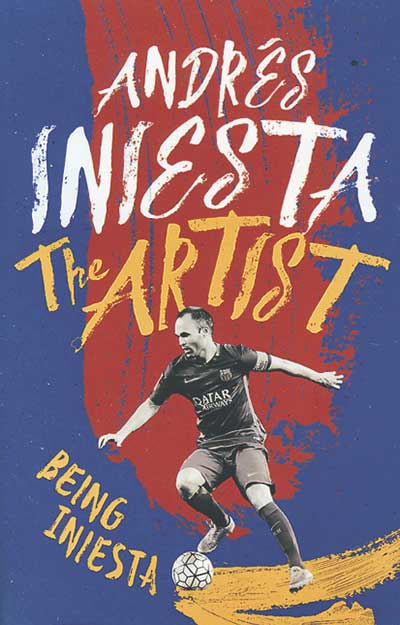Search: ' Espanyol'
Stories
The cups presented for many modern competitions often lack the appeal of their predecessors
Read more…
 Rangers, Britain & Scottish independence
Rangers, Britain & Scottish independence
edited by Alan Bisset and Alasdair McKillop
Luath Press, £8.99
Reviewed by Gordon Cairns
From WSC 331 September 2014
The editors of Born Under A Union Flag have taken on an ambitious task: to quantify Rangers fans’ relationship not only with Scotland but the United Kingdom as a whole. A difficult terrain to map, as historically the club has been considered the team of a union that may be dissolving. That Rangers are in this position as a Unionist team in a country falling out of love with the UK is due to a particular set of circumstances which occurred at the turn of the last century, when a challenger was sought for a successful team of immigrants. The fanbase of this new champion just happened to be drawn from the Catholic-free zone of the Govan shipyards.
As Scotland has moved from being strongly identified with Britain, the position of Rangers has shifted too, from the establishment team to that of outsiders, while ironically it is the “rebel” club Celtic who have had one of the UK’s most right-wing home secretaries of recent memory, John Reid, on their board. The 14 authors, representing both opinions on the issue of Scottish independence and all bar one fans of the club, examine Rangers’ place in the UK with varying degrees of success, using a mixture of personal experience and historical perspective, with the latter the more persuasive to this non-Old Firm fan.
Historian Graham Walker convincingly charts the shift from Rangers as the establishment team to “becoming at odds with the country as a whole”, and casts light on how the support evolved to deal with this change, illustrated through the recasting of God Save the Queen as a subversive anthem. The song gained popularity in the 1980s as the club fell out of favour with mainstream opinion. Although the purpose is to wind up the anti-monarchy opposition, and I must admit it has this effect on me, Walker describes a rendition of the national anthem to illustrate his argument that many fellow fans are more concerned with showing their loyalty than supporting the team. Rangers’ last game in Europe was a must win against NK Maribor in 2011; as the team pushed for the decisive goal in the last few minutes, the crowd began to chorus the dirge-like anthem rather than the Ibrox roar, destroying the momentum on the pitch while creating an atmosphere of resignation and defeat, and so the team failed to progress.
While calling for a constitution to be created for the club, editor Alasdair McKillop looks to Barcelona as a model. He argues that “Celtic have a morally infused narrative that is entwined with the socio-economic progress of the community”, backing up their claims to be “more than a club”. In my opinion, as Rangers’ estrangement from Scottish society grows and their fans continue to utilise British symbolism and song, they could mirror Barcelona’s “other” club, Espanyol (ie “the Spanish”), and become the quintessentially British club, or that of the outsiders – especially if Scotland breaks from the union.
“Better Together” or “Yes” campaigning pollsters will be sorely disappointed if they read this book hoping to get an insight into how this considerable section of Scottish society might vote on September 18. However what it does do is take the temperature of Rangers fans at an important juncture of Scottish history.
 A History of the Goalkeeper
A History of the Goalkeeper
by Jonathan Wilson
Orion Books, £20
Reviewed by Jonathan O’Brien
From WSC 314 April 2013
Of all the “name” football writers on the merry-go-round today, Jonathan Wilson is arguably the best value, even if a few of his many theories and pet obsessions tend towards the overly self-indulgent. He’s a busy man, too – running the quarterly Blizzard while producing columns for the Guardian and Sports Illustrated and roughly one book per year. The Outsider is his sixth tome since 2006, the kind of workrate that sees a lot of writers spread themselves too thinly. But Wilson’s prodigious energy doesn’t seem to dilute the quality of what he comes up with and this meticulous study of the goalkeeping art is characterised by the attention to detail that he brings to everything he writes.
Starting with a study of football in the 1800s, he demonstrates how the mere fact of being a goalkeeper has always carried with it the smell of the scapegoat. In Victorian times the position was occupied by small boys, “duffers” and “funk-sticks” (milksops who had failed to perform elsewhere on the pitch). As the years went on and the sport evolved at snail’s pace, deaths were commonplace for keepers – Celtic’s John Thomson, accidentally kicked in the head during a match in 1931, being an infamous example.
Wilson has put in plenty of air miles, heading for locales as far-flung as Brazil and Russia. The latter country, which once produced great keepers by the lorryload, has nursed a special obsession with the position since before the 1917 revolution (an assertion backed up with quotes from none other than novelist Vladimir Nabokov). Brazil, contrariwise, has had mostly white keepers due to some strange socio-racial issues – the odd exception such as Dida not withstanding. Although, as Wilson shows, English football has nurtured a similar instinctive distrust of black keepers.
African keepers, specifically, sit even lower down the food chain of perception. Two of the best, Cameroon’s Thomas N’Kono and Joseph-Antoine Bell, enjoyed a (mostly) friendly 20-year rivalry after learning from Yugoslavian legend Vladimir Beara. N’Kono was the natural, Bell the hard worker. N’Kono shone at the 1982 World Cup, got a move to Spain out of it and became an Espanyol hero. Bell had to wait until the disastrous USA 94 campaign to play in the finals, by which time he was 39 and too far over the hill to do himself justice.
Wilson’s fondness for idiosyncratic structuring sometimes weakens the book’s sense of direction. The Brazilian chapter abruptly veers into Scotland for several pages, then heads back to Brazil. Not that the material therein isn’t interesting or informative – the passages concerning the appalling bad luck that plagued Jim Leighton’s long career are particularly vivid – but layering the material in such an odd way seems unnecessarily perverse.
In the main The Outsider is a terrific history of its subject. It wears its knowledgeable perspective lightly and deftly works its vast research into the text without battering you over the head with it. Wilson can always be relied upon to come up with something a little bit different and a little bit special, and this has plenty of both.
 Manchester City are the new champions but, as Tony Curran explains, their unethical hoarding of players has tarnished their Premier League victory
Manchester City are the new champions but, as Tony Curran explains, their unethical hoarding of players has tarnished their Premier League victory
Harry Dowd was a goalkeeper who played for Manchester City during their glory years of the late 1960s and early 1970s. He was a reasonable keeper but apparently an excellent plumber. Legend has it that he used to negotiate job offers with crowd members behind his goal, offering competitive rates for bathroom re-fits when play was at the other end.
